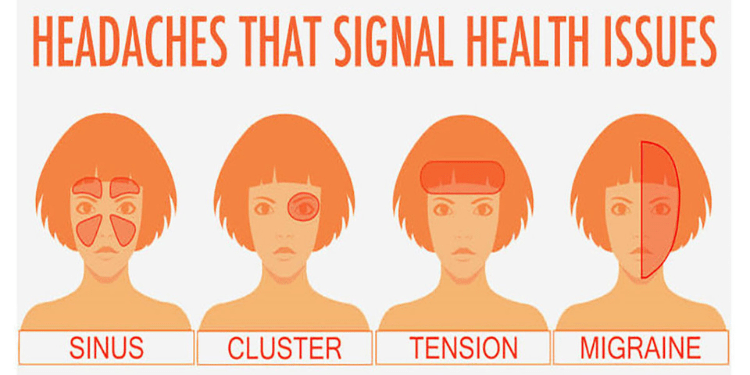Headaches are among the most common health complaints, but they are not all the same.
The type, location, and severity of a headache can provide important clues about underlying health issues.
Instead of masking the pain with over-the-counter medications, understanding the root cause of your headache can help you address the problem effectively.
Here’s how different types of headaches can reveal what might be wrong with your health and what you can do about them.
1. Tension Headaches: Stress and Poor Posture
Symptoms:
- A dull, aching pain that feels like a tight band around the forehead or back of the head.
- Often accompanied by neck or shoulder tension.
What It Might Indicate:
- Chronic Stress: Emotional or physical stress causes muscle tension, leading to these headaches.
- Poor Posture: Sitting for long periods or improper alignment can strain neck and shoulder muscles.
What to Do:
- Practice stress management techniques such as deep breathing, yoga, or meditation.
- Take regular breaks to stretch and adjust your posture if you work at a desk.
2. Migraines: Hormonal Imbalances or Neurological Issues
Symptoms:
- Throbbing or pulsing pain, often on one side of the head.
- Sensitivity to light, sound, or smells, nausea, and visual disturbances (auras).
What It Might Indicate:
- Hormonal Changes: Migraines are common during menstruation, pregnancy, or menopause due to fluctuating estrogen levels.
- Neurological Sensitivities: Migraines may result from overactive nerve pathways and blood vessel changes in the brain.
What to Do:
- Maintain a consistent sleep schedule and avoid known triggers like caffeine, alcohol, or certain foods.
- Consult a healthcare provider about preventive treatments or medications, especially if migraines are frequent.
3. Cluster Headaches: Vascular Issues
Symptoms:
- Severe, sharp pain around one eye or temple, often accompanied by redness, tearing, or nasal congestion.
- Occur in cycles or “clusters,” lasting weeks or months.
What It Might Indicate:
- Vascular Changes: Blood vessel dilation or constriction near the brain may trigger these headaches.
- Hypothalamic Dysfunction: The hypothalamus, which regulates circadian rhythms, may play a role in cluster headaches.
What to Do:
- Consult a doctor immediately for treatment, as over-the-counter medications are usually ineffective. Oxygen therapy and prescription medications may help.
- Maintain a regular routine to support your body’s internal clock.
4. Sinus Headaches: Allergies or Infections
Symptoms:
- Pressure or pain around the forehead, cheeks, or nose.
- Often accompanied by nasal congestion, runny nose, or fever.
What It Might Indicate:
- Sinus Infections: Inflammation or infection in the sinuses causes these headaches.
- Allergic Reactions: Seasonal or environmental allergies can lead to sinus blockages and headaches.
What to Do:
- Use saline nasal sprays or humidifiers to relieve sinus pressure.
- Seek medical advice if symptoms persist, as antibiotics may be needed for bacterial infections.
5. Rebound Headaches: Overuse of Painkillers
Symptoms:
- A constant, dull headache that worsens after stopping pain medications.
What It Might Indicate:
- Medication Overuse: Taking painkillers too frequently can lead to dependency and rebound headaches when the medication wears off.
What to Do:
- Gradually reduce your use of over-the-counter medications under the guidance of a healthcare provider.
- Explore alternative treatments like physical therapy or biofeedback to manage chronic pain.
6. Hypertension Headaches: High Blood Pressure
Symptoms:
- A throbbing headache, often at the back of the head, that may worsen with physical activity.
- May be accompanied by dizziness, blurred vision, or shortness of breath.
What It Might Indicate:
- Hypertension: Severe or uncontrolled high blood pressure can cause headaches due to increased pressure in blood vessels.
What to Do:
- Monitor your blood pressure regularly and consult a doctor if it’s consistently high.
- Adopt a heart-healthy lifestyle with a balanced diet, regular exercise, and stress management.
7. Ice Pick Headaches: Nerve Irritation
Symptoms:
- Sudden, stabbing pain that feels like an ice pick piercing the head.
- Pain is brief but intense and can occur randomly.
What It Might Indicate:
- Nerve Irritation: Often associated with conditions like migraines or cluster headaches.
What to Do:
- While these headaches are usually harmless, frequent episodes should be evaluated by a doctor.
- Avoid known triggers and maintain a healthy routine.
8. Dehydration Headaches: Lack of Fluids
Symptoms:
- A dull, throbbing headache accompanied by dry mouth, fatigue, or dizziness.
What It Might Indicate:
- Dehydration: Insufficient fluid intake reduces blood flow and oxygen delivery to the brain.
What to Do:
- Stay hydrated throughout the day, especially after physical activity or in hot weather.
- Drink water or electrolyte-rich fluids like coconut water.
When to See a Doctor
While most headaches are benign and can be managed at home, some require immediate medical attention:
- Sudden, severe headaches that feel like the “worst headache of your life.”
- Headaches accompanied by confusion, weakness, or vision changes.
- Persistent headaches that do not respond to medication or lifestyle changes.
Headaches are your body’s way of signaling that something might be wrong. By paying attention to the type and location of the pain, you can uncover potential health issues and address them effectively.
Listen to your body, make the necessary adjustments to your lifestyle, and consult a healthcare professional if needed.
Share this article to help others understand what their headaches might be trying to tell them!
